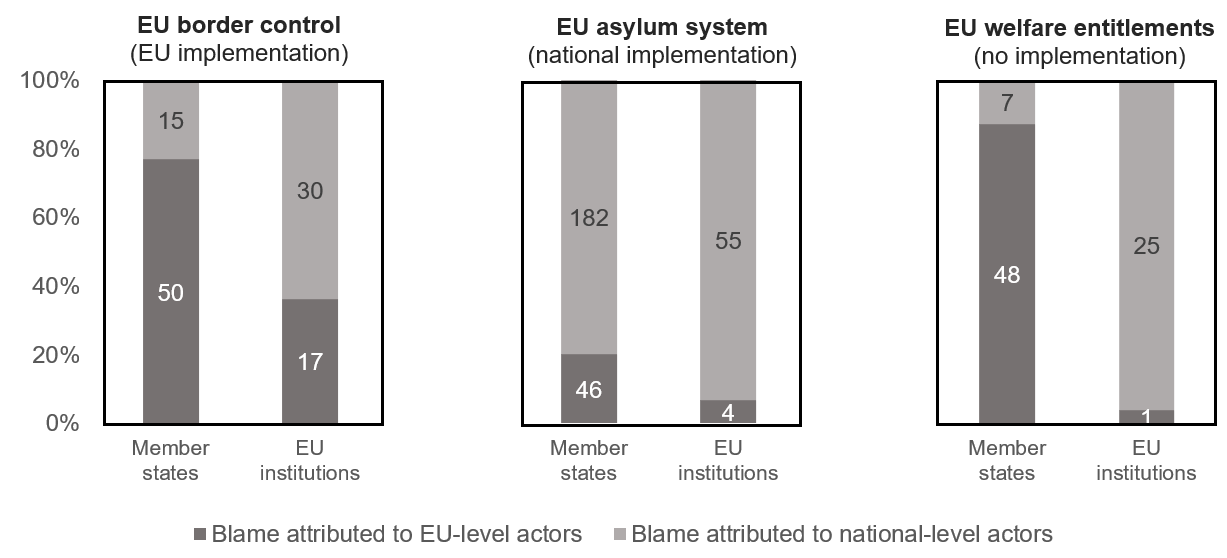Should centrist parties be classified as pro-EU or Eurosceptic? Drawing on new research, Stephanie Luke shows how parties of the centre vary in their degree of support for European integration.
Are centrist parties pro-European? Existing research on this question focuses on the development of party-based Euroscepticism, which rests on the distinction between opposition to the EU as a whole and opposition to certain aspects of the EU. However, this conceptualisation of party attitudes towards European integration fits imperfectly to centrist parties.
In a new study, I offer a novel typology that creates a greater understanding of party positions on European integration across the political spectrum. I identify three different patterns of support – enthusiast, equivocal and critical Europhile – that capture the nuances of centrist party positions.
I then combine this with patterns of Euroscepticism identified by Sofia Vasilopoulou, who identifies three aspects of European integration that underpin Eurosceptic attitudes: namely attitudes toward the principle of cooperation, current EU policy and the future of the EU polity. This allows me to construct a continuum spanning from positions that support European integration to positions that oppose it.
A continuum of attitudes toward European integration
I label the first step in my continuum enthusiast Europhile. This category is comprised of parties that accept the principle of cooperation but advocate reform of both current EU policy and the future of the EU polity. These parties support multi-lateral cooperation, advocate greater cooperation and support the future of European integration with the aim of creating an ever-closer union, but while advocating reform.
The second step in the continuum is the equivocal Europhile category. Here, support for the principle of European integration is likely to be based on wanting to reform the system from within. However, equivocal Europhiles also take positions that could weaken multi-lateral cooperation, including opposing cooperation such as joining the single currency. Equivocal Europhiles criticise some policies while praising others, but they never fully accept the EU in its current form and seek to alter the future trajectory of the EU.
The third step is labelled critical Europhile. This incorporates parties that accept the principle of cooperation but criticise current EU policy and the future of European integration. These parties want the EU to be limited to a small number of policy areas such as the economy. They reluctantly support the principle of multilateral cooperation, but sometimes cite the political character of the EU as an argument to oppose further integration. They reject more powers being transferred to the EU and are against an ever-closer union.
The fourth step is the conditional Eurosceptic category. These parties accept the principle of cooperation but are hostile to current EU policy and the future of the EU polity. While the significance of nation-state cooperation at the European level is recognised, the EU’s institutional balance and policy status quo are viewed as unacceptable because they compromise national sovereignty. Cooperation is accepted as long as state sovereignty is not compromised, but they strongly oppose ever-close union.
Finally, there is the rejectionist Eurosceptic category. These parties express strong opposition to the principle of cooperation, current EU policy and the future of the EU polity. For these parties, withdrawal from the EU should occur at any cost.
Centre-left parties
To examine this issue further, I have carried out a comparative analysis of national and European manifestos of centre-left and centre-right parties in Austria, Germany and the UK between 1990 and 2019.
The Social Democratic Party (SPD) of Germany was the most supportive of European integration in this analysis. In other words, it was an enthusiast Europhile advocating more cooperation between member states, including the creation of an economic government, a European army and a defence fund.
The promotion of EU values was used as a justification for supporting EU enlargement, but in 2017 it was also used to oppose Turkey’s EU membership because the actions of the Turkish government were viewed as being against the EU’s shared values. In 2019, the SPD emphasised that the goal remained the further development of the Eurozone into a social, economic and political union. Despite support for enlargement becoming subdued, the SPD continued to advocate greater cooperation and reform.
In contrast, both the Social Democratic Party of Austria (SPÖ) and the British Labour Party’s positions were characterised by both support for and opposition to the EU. Both supported enlargement of the EU, but while the SPÖ strongly supported the accession of the Western Balkans, it was much more reluctant in relation to Turkey’s EU membership.
On the other hand, Labour supported enlargement in general because it wanted limited European integration. While Labour supported economic integration, it switched in 2015 from promising that there would be no membership of the euro without a referendum, to stating that Britain would not join the single currency at all.
In terms of the future of European integration, in 2019 the SPÖ stressed that “the EU is not perfect” and that if it were left entirely up to the party, “the EU would look very different”. In contrast, while Labour continued to support Britain’s EU membership, it promised no transfer of powers to the EU without an in/out referendum in 2015 and then after the Brexit referendum in 2016, Labour changed its position and became a rejectionist Eurosceptic by supporting a close and cooperative relationship with the EU to deliver Brexit.
Centre-right parties
In Germany, while initially the Christian Democratic Union (CDU) was more supportive of European integration than its sister party the Christian Social Union (CSU), by 2019 both parties were equivocal Europhiles.
Both parties became increasingly hesitant about the prospect of future enlargement. They both opposed Turkey’s EU membership, with the CSU in 2009 opposing Turkey’s membership because it does not share “common cultural and historical roots” with EU member states, and the CDU in 2014 stressing that it did not meet the accession criteria. They emphasised that “not every problem in Europe is a task for Europe”, but also that they wanted to strengthen European democracy and reform the euro. By 2019, the CDU had adopted the CSU’s arguments, including that there would be no membership for Turkey in the EU because “our Europe knows its borders”.
In Austria, the People’s Party (ÖVP) had changed from being an equivocal Europhile to a critical Europhile by 2017. While the ÖVP supported enlargement, particularly of the Western Balkans, it became more reluctant to support Turkey’s membership. From 2006, the ÖVP emphasised that it did not endorse all of the EU’s developments and by 2017 it was stating that common trade must be at the EU’s centre.
The understanding that the EU should focus on economic integration was a position also shared by the Conservative Party in the UK. The party had consistently (from 1997 onwards) expressed a desire to “be in Europe but not run by Europe”, opposing ever-closer union and the further transfer of powers to the EU. However, EU membership was not opposed until after the Brexit referendum result in 2016, whereby the party took up a rejectionist Eurosceptic position to deliver a “smooth and orderly departure from the EU”.
Overall, this research shows that centrist parties not only vary in their degree of support for European integration but also change their positions over time. Criticism of the EU has become a central characteristic of centrist party positions, but they broadly remain supportive of European integration. The framework outlined above allows us to go beyond the binary Eurosceptic-Europhile typology, providing a clearer understanding of domestic party positions and policy outcomes at the EU level using an approach that is widely applicable to other party families.
For more information, see the author’s accompanying paper in Party Politics
Note: This article gives the views of the author, not the position of EUROPP – European Politics and Policy or the London School of Economics. Featured image credit: Drop of Light/Shutterstock.com




